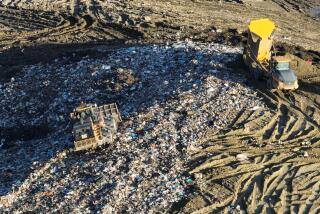Strides Made on New Waste Disposal Agency
SACRAMENTO — Gov. George Deukmejian and legislative leaders have agreed to create a powerful new state agency to oversee solid waste disposal but still are negotiating over the makeup of the new board and whether incineration should be a part of the package, sources said Wednesday.
Major strides toward an agreement were made during a closed-door meeting Tuesday when the Republican governor gave in on some key points and offered legislative leaders a compromise plan to create the new board, sources said.
The governor’s proposal calls for a full-time, six-member board that would begin operation Jan. 1, 1991, with powers comparable to the state Energy Commission or Water Resources Control Board.
After sleeping on the proposal overnight, the Legislature’s two top Democrats--Assembly Speaker Willie Brown (D-San Francisco) and Senate President Pro Tem David A. Roberti (D-Los Angeles)--indicated on Wednesday that they are generally supportive of the governor’s plan.
But a stumbling block still is incineration, which is controversial because it produces air pollution.
‘Creates a Problem’
“The governor is into incinerating everything, or as much as possible,” the Speaker said. “That spews stuff into the air, and that creates a problem.”
Michael R. Frost, Deukmejian’s chief of staff, said the governor still believes that incineration must be part of the state’s new policy on solid waste disposal, along with recycling and other measures.
“We fully agree (with recycling) and are completely committed to that,” Frost said. “But we also believe that another option that should be available is incineration. We don’t think that recycling and source reduction is going to be enough to stop the proliferation of acreage that is being gobbled up by landfills.”
Frost said technology exists today that would allow for the clean burning of trash without a diminution of air standards.
The governor’s chief of staff said that Deukmejian’s compromise proposal on the makeup of the board “was in response to (legislators’) concerns raised to us.” He said he fully expects some give by Democrats on “concerns we are raising to them. . . .”
“One of them is incineration,” he said.
All sides appear to be in agreement on a establishing a new state policy mandating at least a 25% reduction in the volume of garbage collected by local governments by the mid-1990s. Ultimately, the goal would be a 50% reduction in garbage.
The proposal is in response to the growing problem local governments have in finding ways to get rid of ever-increasing piles of garbage.
The negotiators agree that the primary emphasis on the new solid waste program should be on recycling and measures aimed at cutting down on the amount of garbage going to landfills, such as expansion of programs that transform leaves, grass clippings and other organic matter into compost.
The proposed legislation would require local governments to submit a plan to the revamped state solid waste management board laying out in detail how they planned to meet the state target. The new agency would have to approve the plan. The state board would have the power to levy fees and impose penalties.
Assemblyman Byron D. Sher (D-Palo Alto), chairman of the Assembly Natural Resources Committee, is a member of a legislative task force that has been advising the governor and legislative leaders.
“Our goal is to create a strong board,” he said. “It must have powers like the Air Resources Board, or the Water Resources Control Board. The governor’s proposal is real progress toward that goal.”
At one point, Deukmejian was talking about requiring the curbside separation of trash, which would make recycling easier. Now he is said to be in agreement with lawmakers that placing a requirement on local governments to reduce trash 25% would have the same effect without actually mandating the separation.
Frost said even though most of the methods of collection and separation of garbage will be left up to local governments, “I would certainly expect that (requiring curbside separation) is one of the methods they would use to meet the goals.”
More to Read
Get the L.A. Times Politics newsletter
Deeply reported insights into legislation, politics and policy from Sacramento, Washington and beyond. In your inbox three times per week.
You may occasionally receive promotional content from the Los Angeles Times.










